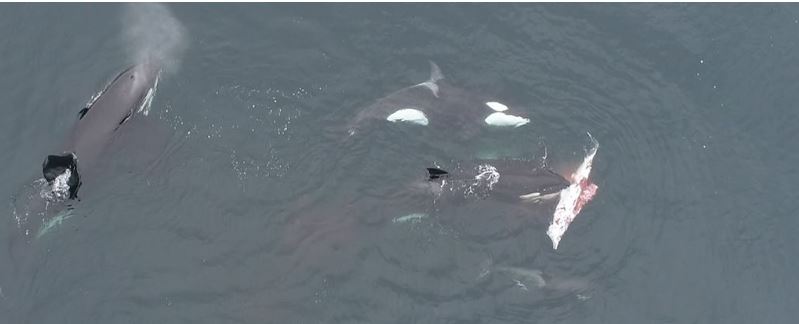


 2:59:38
2:59:38  2024-09-27
2024-09-27  1253
1253

In the Humboldt Current, off the coast of Chile, an enigmatic pod of orcas has been seen tearing apart unexpected prey.
On multiple occasions, scientists and citizen scientists observed the sleek and efficient predators feasting on dusky dolphins. It's the first time orcas have been seen hunting this species of dolphin in the Homboldt current – a surprise to marine scientist Ana Maria García Cegarra of the University of Antofagasta in Chile, who led a study on the phenomenon.
What's even more surprising is the way the orcas then divvied up and shared their kills, similar to the way a human family might: the mother holding the kill in her mouth so her baby could take bites.
"Just in 2020 an article showed orcas hunting South American sea lions but we did not know that they may predate also on other marine mammals such as dolphins and even whales!" García Cegarra told ScienceAlert.
"But the most impressive was to observe with the use of a drone the behavior of sharing the dolphin meat among orca group members. We observe how the mother and the calf feed first and later the adult male. It was like a ritual of food sharing similar to humans when we eat on Sundays with our grandmother and grandfather. I remember when I was a child my grandmother used to serve me as a child first and later adults eat."
There is way too much we don't know about orcas. They can be found all around the world, and they're all lumped under one species designation, but they are not all alike. Different populations have different migratory patterns, and they all feed on different prey types. Some prefer fish, others whales, others seals.
They also have slight physical differences, and their own orca dialects. These groups don't intermingle or interbreed, and they can even be distinguished from each other genetically. They appear to be differentiating into separate species, if they're not there already – and if we want to understand and protect them, we need to understand how each group (known as an ecotype) is distinct from the others.
A group of orcas that cavort through the Humboldt Current known as the Menacho group are particularly poorly understood. It's unclear whether they are an ecotype unto themselves, or belong to a larger group. García Cegarra and her colleagues have been working to fill in these gaps in our knowledge, conducting surveys and documenting sightings from citizen scientists to observe the breathtaking animals in their natural environment.
In all, they documented 28 sightings of the orcas in the Humboldt Current system – and, on two of those occasions, the orcas were observed and photographed eating dusky dolphins.
It's not the first time orcas have been observed feasting on the cetaceans and sharing the kill. The behavior has been observed off the coasts of New Zealand and Argentina. But it had not been observed before by the Menacho group, and not in the South Pacific Ocean.
The discovery could suggest that the Menacho group could belong to the same ecotype as the New Zealand and Argentina orcas, known as Type A. There are other similarities; the Argentina orcas also prey on sea lions, as does the Menacho group. If the Menacho group belongs to the Type A ecotype, it means this group of orcas has a much larger range than we knew.
"The fact that we have orca specialists on marine mammals in the Humboldt Current may indicate that they probably belong to ecotype A from the Southern Hemisphere. However, ecotypes in the Southern Hemisphere have been described mainly around the Antarctic," García Cegarra explained.
"If we prove that this ecotype is specialist in marine mammals and have a special hunting technique never observed in other groups this will be exclusive of this pod and should be considered as a separate group for protection and conservation."
Orcas don't currently have a conservation status with the IUCN; they are listed as "data deficient" due to the lack of information we have about them. We don't know how many there are, or whether their population numbers are stable.
The discovery of the Menachos orcas hunting dusky dolphins is a piece of the puzzle. Prey availability is a major concern for conservation, and human activities can influence the range and distribution not just of the orcas, but the animals they feed on for survival.
"All research efforts are needed in order to provide them with a conservation status," García Cegarra told ScienceAlert.
"The existence of a newborn orca in the area indicates that this is not just a foraging site but also a nursing area. We must evaluate which human activities may put at risk the survival of this newborn, as they forage in areas where artisanal and industrial fishing is occurring at the same time and hence the probability of collision with vessels or bycatch could be imminent.
"A conservation status of orcas is needed in order to propose conservation strategies to improve their health."
Reality Of Islam |
|

Labor short

A new ultra

Batteries p
 9:3:43
9:3:43
 2018-11-05
2018-11-05
10 benefits of Marriage in Islam
 7:5:22
7:5:22
 2019-04-08
2019-04-08
benefits of reciting surat yunus, hud &
 9:45:7
9:45:7
 2018-12-24
2018-12-24
advantages & disadvantages of divorce
 11:35:12
11:35:12
 2018-06-10
2018-06-10
 6:0:51
6:0:51
 2018-10-16
2018-10-16
 10:47:11
10:47:11
 2022-11-22
2022-11-22
 2:34:48
2:34:48
 2022-01-18
2022-01-18
 7:32:24
7:32:24
 2022-02-14
2022-02-14
the happy life of mankind requirement
 6:36:36
6:36:36
 2022-01-25
2022-01-25
 7:59:14
7:59:14
 2018-06-21
2018-06-21
 6:28:21
6:28:21
 2022-12-20
2022-12-20
 7:0:55
7:0:55
 2022-05-17
2022-05-17
 5:41:46
5:41:46
 2023-03-18
2023-03-18
| LATEST |